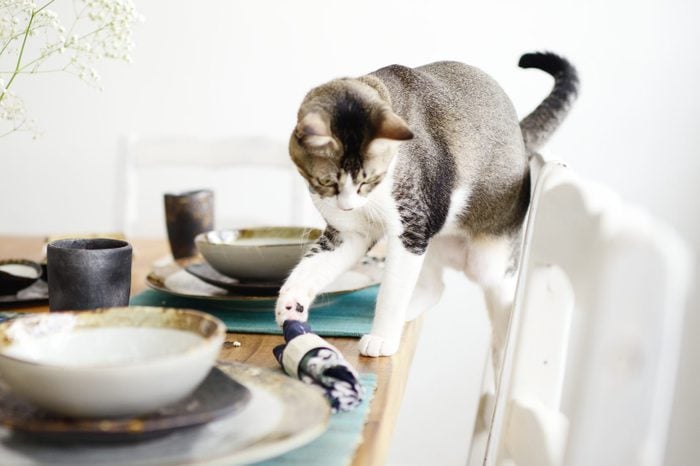Why Do Cats Knock Things Over?
Updated: Jul. 25, 2023

Epic purring, adorable antics and cozy cuddles generally keep cat lovers content. But then there's the feline frenzy to knock things over. What gives?
Some cats are affectionate, others are aloof. Some love to pounce around and play, while others prefer to lurk mostly out of sight. Then there’s that thing where a cat zooms from one corner of a room to another in a blur, as if possessed. These are just a few of the many vagaries of living with felines. But there are certain consistent questions that captivate owners across the board, no matter what kind of personality their cat has. For instance, why do cats sleep so much? Why do cats meow? Why do cats purr? And why do cats knead any available pillow or blanket?
Another question that often rears its head—pretty much every time a cat bats something off a table, desk or counter—is why do cats knock things over? Is it a hardwired feline obsession with what we humans know to be simple gravity? Or is there something else at play?
Get Reader’s Digest’s Read Up newsletter for more pet insights, humor, cleaning, travel, tech and fun facts all week long.
Why do cats knock things over?
In a household with cats, very little that rests on top of a table—or any flat surface, for that matter—is safe. Pens? Batted to the floor. That vase of flowers? Going overboard. Random coins? Down for the count. But why? Why do cats knock things over? While there hasn’t been much scientific research done into this question, cat experts have their own theories.
It feeds their play-prey drive
Cat behaviorist Pamela Merritt, author of The Way of Cats: How to Use Their Instincts to Train, Understand, and Love Them and blogger at wayofcats.com, points out that a play-prey drive exists in all cats, at least to some degree. The level of this drive is a mix of a cat’s genes and early life experiences. A higher prey drive can result in a cat using its paws to knock things over as a means to try to find out more about the environment around them.
It gets attention
Do cats knock things over just to get attention? It could be, because think about it: Chances are, when you see your cat heading for a table, the countertop or your desk, you react quickly, points out Rita Branson Bowman, a cat behavior expert and executive director of Kitty Kat Haven & Rescue, a nonprofit in Alabama. So from the cat’s perspective, looking like they are about to strike means you will swing right into action.
“Any kind of human attention is fun for cats who interact well with their owners, whether the human attention is laughter, looking or even a telling off,” Celia Haddon, a cat behaviorist and author of Being Your Cat: What’s Really Going On in Your Feline’s Mind, explains. “Any of these human reactions reward the cat, who is therefore more likely to do it again. What gets rewarded is repeated!”
How do I get my cat to stop knocking things over?
No surefire method exists for getting cats to stop whacking at things altogether, but there are some strategies you can try in your home.
1. Stop giving your cat attention when they knock things over
If your kitty is knocking things over to get your attention, try not acknowledging them when they unleash the smack attack. “The best way is to turn your back and put your attention on something else,” Haddon says. “Don’t look. Don’t speak. Don’t laugh. Put your gaze somewhere else.”
Keep in mind that cats are persistent creatures, so they may keep knocking things over even if you’ve turned away several times. Haddon advises people to be patient and stay consistent with the withdrawal of attention. “It may take weeks rather than just a few days, but eventually the cat will find this behavior is not rewarded.”
2. Reward your cat for other behaviors
Giving cats plenty of positive attention is a good strategy to try, according to Branson Bowman. Try teaching them another way to get your attention and reward them for doing it.
Haddon also vouches for this strategy. “If you decide you want your cat to sit quietly in its cat bed, for example, give it attention there using eye gaze, verbal praise and the occasional treat,” she explains. “Or you could encourage it in the same way to perform a particular behavior, such as jumping in and out of empty cardboard boxes. Start by throwing a bit of food in an empty box, then when the cat jumps in, lean over and show your delight! Most cats enjoy this.”
3. Thwart boredom by keeping your cat active
Cats get bored if they don’t have enough to do, just like humans do. Haddon advises giving kitties (especially the indoor ones) short play sessions each day with an interactive cat toy, like a play fishing rod. Consider rotating toys in and out to keep them novel.
Another way Haddon says you can squash cat boredom: Turn feeding time into a fun scavenger hunt. If you feed your cat dry food, try scattering your cat’s nibbles around the house to give them something to hunt for. If you prefer to keep your home free of cat food bits, consider buying a puzzle board instead. That way, you contain the dry food to one area while still providing mental stimulation for your feline friend.
Now that the question of “Why do cats knock things over?” has been (at least mostly) answered, what about other burning cat questions? It turns out, feline mysteries are not so mysterious. Why do cats love boxes? Why do cats hate water? How can I tell if my kitty is stressed out? Now you know!
Meet the experts
- Pamela Merritt is the author of The Way of Cats: How to Use Their Instincts to Train, Understand, and Love Them and a blogger at wayofcats.com. She also has experience with cat rescue and now shares her cat expertise and animal activism through online content.
- Rita Branson Bowman is a cat behavior expert, as well as the executive director and co-founder of Kitty Kat Haven & Rescue, a haven for rescue kitties in Hoover, Alabama. She’s been involved with cat rescue for 30 years and is the author of two cat-themed children’s books.
- Celia Haddon is a cat behaviorist and the author of Being Your Cat: What’s Really Going On in Your Feline’s Mind. She holds a bachelor’s degree in applied animal behavior and a master’s degree in clinical animal behavior. She also served as the pets columnist for The Daily Telegraph for 20 years, answering an estimated 100,000 questions on animal behavior.
Additional reporting by Kelly Kuehn.



